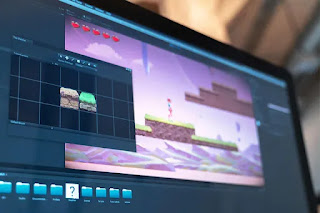Reading One Notes
There is more than on definition to gaming
The formal elements to games
Games like tic-tac-toe have their own interpretations
When criticising a game this isn’t a bad thing- you look at the good and bad parts
The criticism might not make you happy but its important to take it into account. Criticising here means analysing. This can be good as it can bring people together because of the common interests.
People use many games to describe one game but this isn’t good as nothing everyone played the mentioned games.
Katamari Damacy
https://www.youtube.com/watch?v=hEAP-4iUirY
I have done some research on Youtube about this game and I would describe it as a family friendly tycoon simulator where you go around a city and attack items on the ball.
You can use terminology for game design but its a slower process.
The correct definitions:
“A game has “ends and means”: an objective, an outcome, and a set of
rules to get there. (David Parlett)”
“A game is a “voluntary effort to overcome unnecessary obstacles.””
“Games are a “form of art in which the participants, termed players, make
decisions in order to manage resources through game tokens in the
pursuit of a goal.” This definition includes a number of concepts not seen”
Wrong definition:
closed, formal system”
I took note of all the elements as I felt it was necessary for my improvement within this module and all my future work.
This reading gives us many examples on why the above definitions were all imperfect. Logic games are different from role-playing games or choose your own adventure books.
It has to come a point where there are questions like are games a form of play? Like playing with a ball etc. and if games are stories?
The reading improved my growth mindset as it’s more open-minded now.
The purpose of this reading was not to help us physically but mentally especially with vocabulary to communicate in “a meaningful way”.
Make a game on paper or Microsoft paint.
Relieve the stress
Ask a lot of questions to yourself while your doing this.
Conflict in games makes it interesting.
You don’t need to be a professional at programming to make a game.
Reading two notes
The ideas aren’t accidental
Everyones views and process of research are different and affect the final idea
The gaming industry is considered new and has “higher future growth prospects”.
Competition within the industry as fewer games within the industry are profitable.
Companies look for talented teams with atmospheres that encourage creativity.
Those are some of the core values of game design companies.
In a conference a lady has come forward and said that game companies should recruit “outside of their comfort zone”.
Even the most creative people struggle with repetition.
“the ability to generate ideas is shown to be one of the characteristics of successful business ventures”
Lack of systemic approaches to games
“studies show that creativity training has the highest impact on originality of the ideas”
Systemic Techniques:
Brainstorming
Ideas come from other games or similar things for inspiration.
Not many studies have been done on creative processes in game design.
“game design should be seen as an organic process”
Inspiration sources:
Watching shows and movies, playing other games, reading etc.
Formal techniques do not result in truly original ideas.
“Good designers are judged on the value of their creative thoughts, not on their skills to use ideation techniques”
“game ideas work as a starting point for game production”
Reading three notes
The techniques are:
- Concentration
- Brainstorming
- Scamper
- Ramsey
Brainstorming:
Statement of the Task
resources aka the amount of money, the number of team members etc.
Generation of Ideas
Grouping and Selection
Scamper
Methods
Substitute
Combine
Adapt
Modify
Put/ apply
Eliminate
Reverse
The Ramsey method
if you want to become a high-class specialist:
Remember: Ramsey wrote a theory that, if you take a significant amount of information and start looking at it closely and manically, you can find new information or find inconspicuous links. This explains why people with various psychological disorders, like paranoia and schizophrenia, can see evidence everywhere of their rightness and their theories. This theory can also be used in the opposite direction, creating previously unobtrusive concepts at first glance. The essence of this method is that you collect the maximum amount of information on the topic that you need to assemble the games. And then you start to study this data, looking for hidden connotations and imperceptible connections in it until the concept of the game is collected from these pieces. The effectiveness of this method depends only on two factors: the amount of information received and the effort spent studying this information.
Personal Links from my interests:
Article one: https://www.gamedesigning.org/learn/game-elements/
What I like about this article it it basically breaks down with given readings have talked about in less and more easy to understand words.
I like how this article also includes "fun" into this list as the readings were more formal and never mentioned this.
Article two: https://unity.com/how-to/beginner/10-game-design-tips-new-developers
We are currently using Unity as one of our tools for this module and I stumbled upon this section within their website. They included something the readings did not: Design with users in mind, look for viral quality etc. I will go back to this article with my future work.
Article 3: https://www.hindawi.com/journals/ijcgt/2015/549684/



hey Dominika, really like your take on "what is a game". There is so many ways to describe the definition of a game. This post included so much information and was super useful and informative. I cannot wait to see more of your work and also your final game.
ReplyDeleteI really like your academic style of writing:)
Alex
Heyy, Thank you!! Thats true. Thank you for the comments.
ReplyDelete